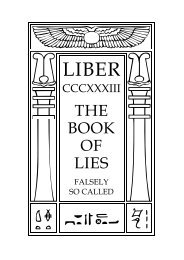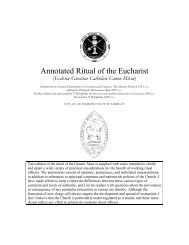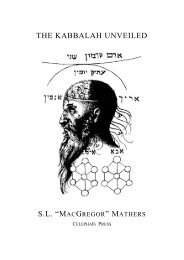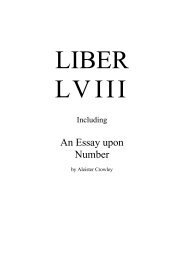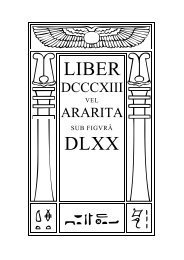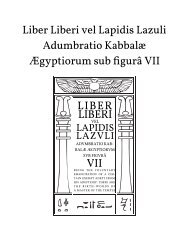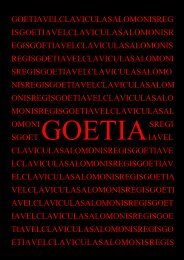ON THE ANIMAL SACRIFICE
ON THE ANIMAL SACRIFICE
ON THE ANIMAL SACRIFICE
You also want an ePaper? Increase the reach of your titles
YUMPU automatically turns print PDFs into web optimized ePapers that Google loves.
<strong>ON</strong> <strong>THE</strong> <strong>ANIMAL</strong> <strong>SACRIFICE</strong><br />
Old aeon magicians adopted the use of animal sacrifices as an alternative to human blood. Animal<br />
blood, after all, is not exempt from Prana (Life Force), and it was not illegal. In fact, the Old<br />
Testament speaks very openly concerning the kind of sacrifices Jehovah likes best. Because of its<br />
biblical popularity it was easier for the magician to convince government and Church authorities<br />
that their sacrifices were intended for “The One God.”<br />
The story of Abel and Cain illustrates how much Jehovah loves his flesh. God loved blood and<br />
flesh so much that he preferred Able's offerings to Cain's because the first offered up flesh and the<br />
other vegetables. Evidently, God dislikes vegetarianism, so Cain, out of jealousy, killed Abel. And<br />
they say vegetarians are non-violent.<br />
In modern day, those magicians who use animals for sacrifices justify the act by proclaiming that<br />
since the animal's spirit was released during a Magical operation it then becomes possible for that<br />
spirit to somehow evolve into something more than just animal.<br />
While I do not condone the destruction of anything but oneself, I personally have a problem with<br />
people who conveniently draw lines between animals in the meat packinghouses and the animal<br />
that is used in a magical operation. People have no problem purchasing parts of the carcass in<br />
Styrofoam packages, yet they are capable of criticizing ceremonial forms of slaughter. To them, the<br />
act of ceremonial sacrifice is, for the reason that it has been connected to Satanism by the<br />
Fundamentalists, more horrible than the way the animal perishes at the slaughterhouses. It is<br />
hypocrisy.<br />
The use of this particular kind of magick has a history going back several thousands of years. It was<br />
(and IS, according to a recent Supreme Court ruling) a valid practice.<br />
According to Sir James G. Frazer's The Golden Bough (1981, Avenel Books N.Y. New York),<br />
many primitive cultures believed that when one consumed an animal one could inherit the virtues<br />
or vices of that particular animal.<br />
For example: There is an ancient Chinese tradition that the courage of all animals resides in the<br />
gallbladder; and that eating the vile of the animal endowed the partaker of its courage. This<br />
tradition still survives today, and the demand has become so great that the illegal exports of bear<br />
bladders by American poachers cut potentially place the American bear to the endangered species<br />
list. In Morocco, one could cure their cowardice by eating Tiger flesh.<br />
Another motivation for ceremonially consuming animals was people's fear towards other creatures<br />
inhabiting the land. It was a popular practice amongst the Eastern African Arabs to eat the fat of<br />
lions, as this would make wild animals flee from them. (Perhaps the fat would cause their bodies to<br />
secrete an odor, which would signal the presence of a Tiger to other animals?)<br />
In Central Africa liver was a popular dish, as it was alleged that the liver was the vessel of the soul,<br />
and one could enlarge their soul by eating it.
There is a South American tribe of Indians who refuse to eat anything but birds, monkeys, fish, and<br />
other agile animals because of their belief that consuming slower, heavier beasts would cause them<br />
to become sluggish, ineffective hunters. (Compare the sluggish, heavy felling of your body after<br />
eating beef with the consumption of chicken or fish.) You are what you eat.<br />
The human animal was not exempt from the dangers of becoming part of the food-chain: In<br />
Australia, Philippines, Africa, New Zealand, and in many other cultures people were often<br />
consumed in order to endow their own tribes with the courage, strength and skills of their enemies.<br />
In at least one Amazonian tribe, it was considered a great honor to be cremated shortly after death,<br />
and the ashes consumed in a ceremonially prepared soup by their loved ones; as this insured the<br />
continuation of the individual through the life of their family members and friends.<br />
Personally, I dislike the idea of taking the life of any unwilling life form. The nature of Will is Life;<br />
hence I must assume that it is not the Will of an animal to be sacrificed for any reason... unless of<br />
course, it tells me so.<br />
Gerald del Campo<br />
June 16, 1985<br />
North Hollywood, CA<br />
Copyright Gerald del Campo 1985. All Rights Reserved



